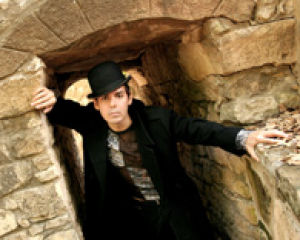Estrada brings mix of humor, political commentary to campus
September 16, 2007
A Texan school teacher. A sassy unwed mother. A gay cable access talk show host.
These were just some of the many faces brought to life by singer/comedian/activist Jade Esteban Estrada in his newest solo play, “Pico de Gallo,” a humorous and eye-opening journey into modern Latino culture. Just in time for the start of Hispanic Heritage Month, Estrada presented the one-man bilingual performance Sept. 6 in White Concert Hall.
First visiting Washburn University in 2005, the gay Latin star performed the award-winning solo play “Tortilla Heaven.” Written by Estrada’s sister Celeste Angela Estrada, it showcased the lives of three generations of a Mexican-American family.
“The audience loved him, and after that initial performance, I knew that we had to have him back again,” said Dona Walker, director of multicultural affairs.
The multicultural department, along with the Hispanic American Leadership Organization, has sponsored both of his appearances.
Since the debut of his solo show “It’s Too Late…It’s Already In Me” more than 10 years ago, the San Antonio native has appeared on television networks such as Comedy Central and HBO Latino while traveling across the nation to share his music and eight solo performances that shed light on issues ranging from gay rights and aids awareness to Latino culture.
Walker particularly enjoyed Estrada’s portrayal of flight attendant “Cynthia Camacho” who, while fluent in Spanish, hasn’t spoken a word of it for three years because “they don’t pay her to.”
“While some of the characters were better than others, I really liked the fact that he interacted with the audience,” said Walker. “They seemed to enjoy it too and it brought about other opinions and views to the issues at hand.”
Estrada explained that he himself did not learn or speak Spanish while growing up because it made his mother feel dirty.
“After my parents split, my sister and I moved in with my grandmother and it was then that she began to teach us the language,” said Estrada.
He then went on to learn Spanish in school and later in life, professionally.
“The more we know the better we are,” said Estrada. “The more that we as a nation become globalized, is the more we will have to understand the characteristics and the languages of people all around the world.”
Freshman Elise Richardson heard about Estrada’s “Pico de Gallo” in the weeks leading up to his arrival and afterward found the show’s topics and characters to be interesting.
“I thought he did a very good job,” said Richardson. “He talked about things that I’ve never even thought of in that way.”
Walker admired Estrada’s ability to bring out the questions that society is afraid to ask and talk about.
“He does it in a humorous way but the issues at hand are still serious,” said Walker.
While Estrada says he enjoys performing more than being about politics, he believes that sometimes the times you live in force you into the forefront of change.
Estrada, who finds being a gay Latino in America to be “most rewarding,” expressed that now is the time to start addressing prejudice and discrimination instead of pretending that it no longer exists.
“This is an era where I believe we are ignoring the pink elephant in the room,” said Estrada. “We are all prejudiced in some way, shape or form, and it’s important to talk about it, we have to learn to live together.”
After his performance, Estrada sat at the edge of the stage answering questions from the audience and encouraging students, regardless of their major, to step up and change the things they don’t like about the country they live in.
“No matter where we come from or who we are, we have to take care of the place we live,” said Estrada.



